#i'm going meta
Explore tagged Tumblr posts
Text
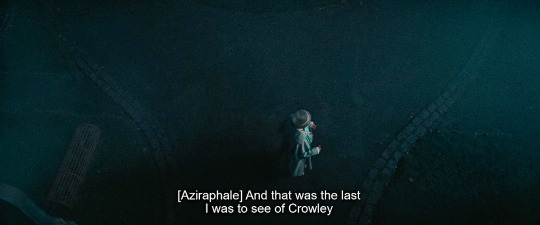
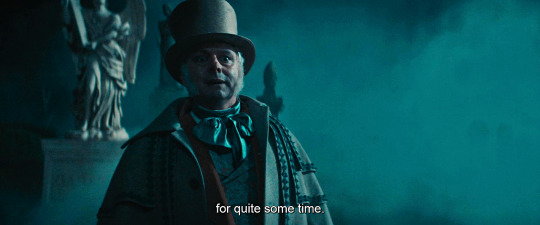
The fact that Aziraphale emerges from this flashback
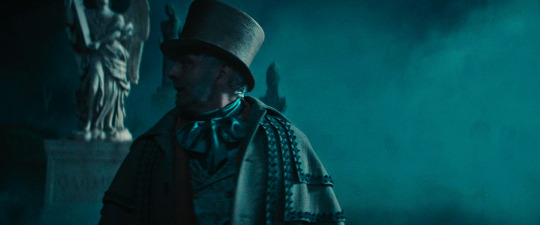
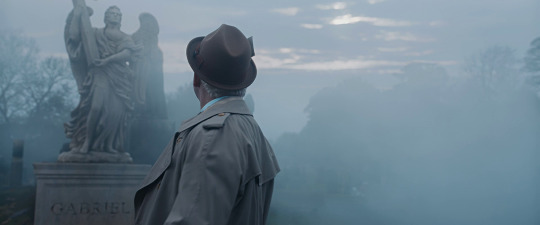
Makes this face
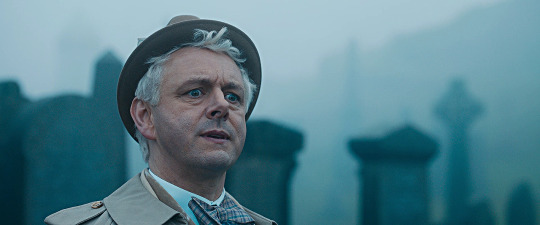
and then with a ginormous gap on the right side of the screen, proceeds to be like "I must call Crowley right now immediately."
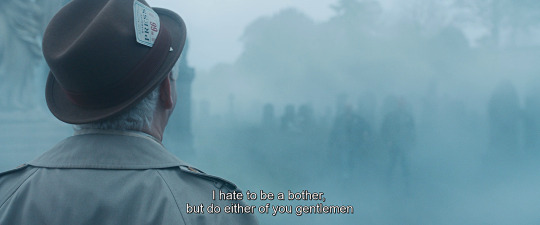
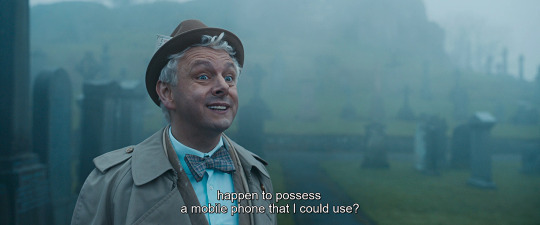
#I believe that Aziraphale in s2 is just as worried as Crowley is#he's just shoving it as far as possible under his little hat#good omens 2#v watches good omens#Aziraphale#I Know Where I'm Going#The Resurrectionists#i am this close to analyzing the screen composition during their phonecall because it's. interesting.#started thinking about this scene when they mentioned changing the weather based on Aziraphale's mood#good omens meta#more in the notes
12K notes
·
View notes
Text
I see a lot of people clowning on the people of Pelican Town for not repairing the community center themselves or clowning on Lewis for embezzling and. like. Those criticisms aren't entirely unfair. But I think instead of coming at it from a perspective of "why can't the townspeople do this" we should be asking "why and how can the farmer do this?"
Like. Think about it. The farmer arrives in Stardew Valley on the first day of spring. By the first day they're obviously different. By day five the spirits of the forest who haven't been seen by the townsfolk in years or generations are speaking to them. By the second week they've developed a rapport with the wizard that lives outside town.
In the spring they go foraging and find more than even Linus, who's spent so many years learning the ways of the valley. Maybe he knows, when he sees them walking back home. Maybe he looks at them and understands that they're different, chosen somehow.
In the summer they fish in the lakes and the ocean for hours on end, catching fish that even Willy's only ever heard of, fish that he thought were the stuff of legend. They pull up giants from the deep and mutated monstrosities from the sewers.
In the fall, their crops grow incredibly immense; pumpkins twice as tall as a person, big enough that someone could live inside. The farmer cuts it down with an axe without even batting an eye. Does Lewis wonder, when he checks the collection bin that night and finds it full to the brim with pumpkin flesh? What does he think? Does he even leave the money? Does he have the funds to pay the farmer millions of dollars for the massive amounts of wine they sell? Or is it someone--something--else entirely?
In the winter, the farmer delves into the mines. No one in Pelican Town has been down there in decades. No one in living memory has been to the bottom. The farmer gets there within the season. They return to the surface with stories of dwarven ruins and shadow people, stories they only tell to Vincent and Jas, whose retellings will be dismissed by the adults as flights of fancy. People walking by the entrance to the mines sometimes hear the farmer in there, speaking in a language no one can understand. Something speaks back.
The farmer speaks to the the wizard. They speak to the spirit of a bear inside a centuries-old stone. They speak to the shadow people and the dwarves, ancient enemies, and they try to mend the rift. They speak to the Junimos, ancient spirits of the forest and the river and the mountain. They taste the nectar of the stardrops and speak to the valley itself. They change Pelican Town, and they change the valley. Things are waking up.
And what does Evelyn think? She's the oldest person in the valley; she was here when the farmer's grandfather was young. (How old *is* she, anyway? She never seems to age. She doesn't remember the year she was born.) Does she see the farmer and think of their grandfather? Does she try to remember if he was like this too, strange and wild and given the gifts of the forest?
And does their grandfather haunt the valley? He haunts the farm, still there even after his death; his body died somewhere else, but his spirit could never stay away for long. Does Abigail, using her ouija board on a stormy night, almost drop the planchette when she realizes it's moving on its own? Does Shane, walking to work long before anyone else leaves their house, catch glimpses of a wispy figure floating through the town? Does the farmer know their grandfather came back to the place they both love so much?
Mr. Qi takes interest in the farmer. He's different, too; in a different way, maybe, but the principles are the same. They're both exceptional, and no matter what Qi says about it being hard work and dedication, they both know the truth: the world bends around the both of them, changing to fit their needs. Most people aren't visited by fairies or witches. Most people don't have meteorites crash in their yard. Most people couldn't chop down trees all day without a break or speak to bears and mice and frogs.
The farmer is different. The rules of the world don't work for them the way they work for everyone else. The farmer goes fishing and finds the stuff of fairy tales. The farmer goes mining and fights shadow beasts and flying snakes. The farmer looks at paths the townspeople walk every day and finds buried in the dirt relics of lost civilizations.
The farmer is a violent, irrepressible miracle, chosen by the valley and destined to return to it someday. Even if they'd never received the letter, they would've come home.
They always come home eventually.
#lich says shit#stardew valley#sorry for the stardew valley meta i'm just so obsessed with how FREAKY the farmer is. Like it's so fun#gonna write another long ass post about the farmer's bloodline specifically and. like.#why did their grandpa leave the valley?? why did their parents never go back??#stardew valley farmer#sdv
4K notes
·
View notes
Text
I keep thinking about how Caleb used to see himself back in Campaign 2, especially early on. 'I am a disgusting person.' Referring to himself as one of the assholes of the group. Constantly talking about himself as damned, corruptible, somehow inherently flawed just by virtue of being a wizard. Resisting every suggestion from those around him that he was good.
And then I think about how, when Essek described him to strangers, the first word he used was kind.
#i'm not ok i'm never going to be ok#critical role#cr spoilers#cr3 spoilers#shadowgast#caleb widogast#essek thelyss#my cr meta
4K notes
·
View notes
Text

It's still interesting that TBoB called more attention to Stan's control over his mindscape (And if you go with the interpretation that the lost pages are partial truths that are heavily influenced by Bill, then he's the one insisting that only someone with training should be able to have that much control over the mind.)
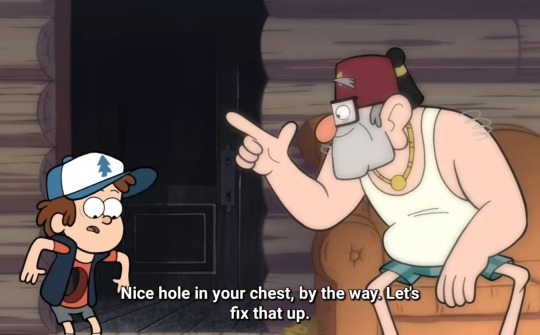
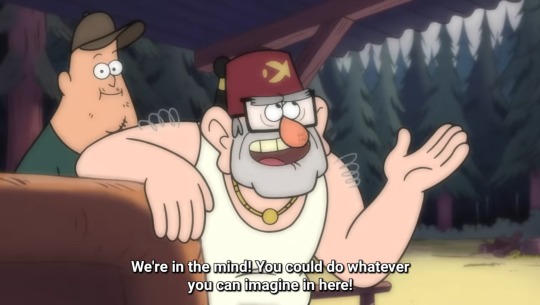
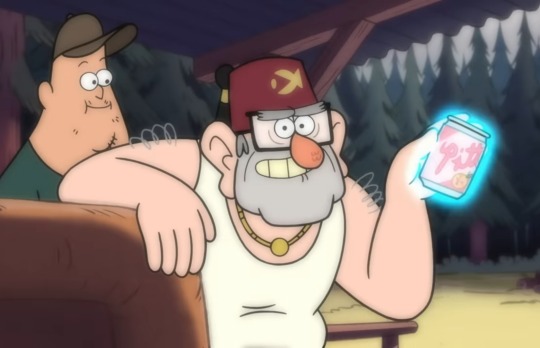
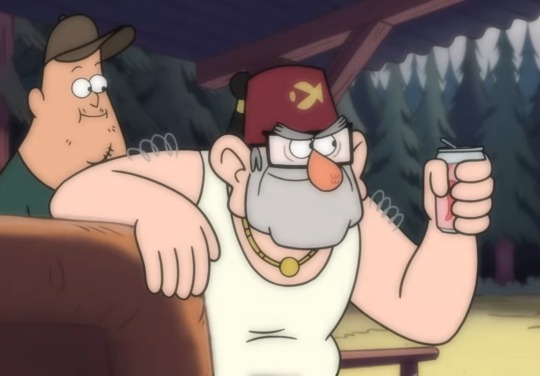
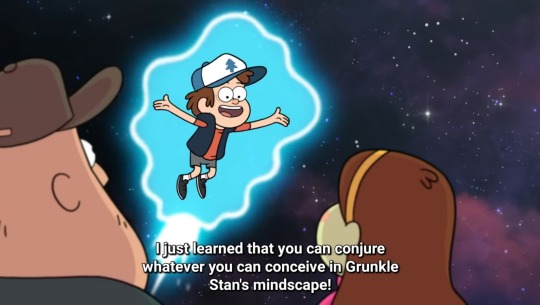

Meanwhile we have a memory!Stan. Someone who apparently knows too much and is rather aware for being a simple memory.
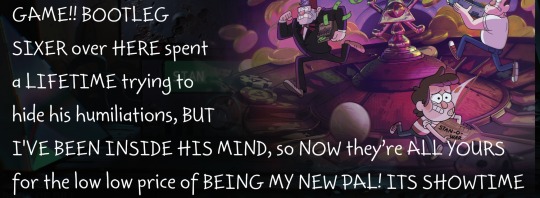
From the Wheel of Shame, we know Bill was able dig up all kinds of dirt on Stan but... that wasn't why he was there in the first place, was it?
Bill couldn't find the code immediately despite a memory of Stan opening the safe being a few hours old at most and decided to have Mabel try find it for him (The original concept of the ep had it far more hidden but this was likely cut because of time constraints)

Ford did experiments on Stan's mind which likely meant using Project Mentem and actually looking around his mindscape, and his only reaction was to comment on his jokes-- despite what little we the audience know being enough to render us sobbing wrecks
(yes I refuse to shut up about this part cos the book's intro is extremely underrated)
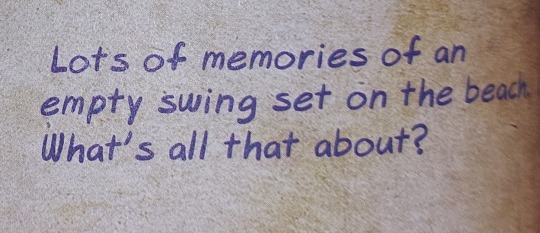
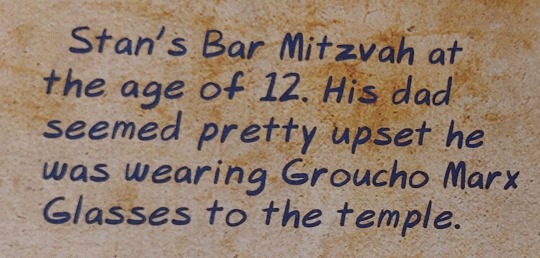
Stan was able to replace his memories of Ford with the swingset instead and managed to hide Ford in his Bar Mitzvah memory. And that's not even mentioning the lack of visible Portal and Stan o' War which noticeably show up in Ford's dreamscape (the broken swingset manifesting anyway pains me tho)
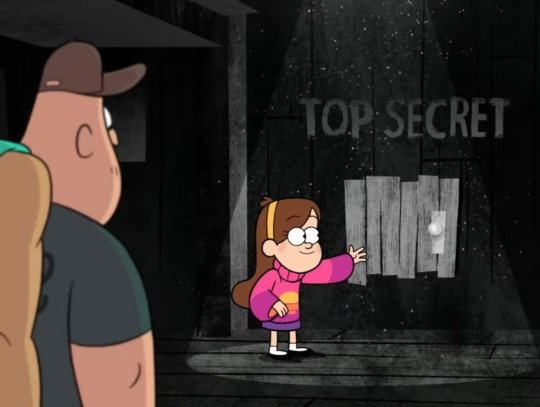
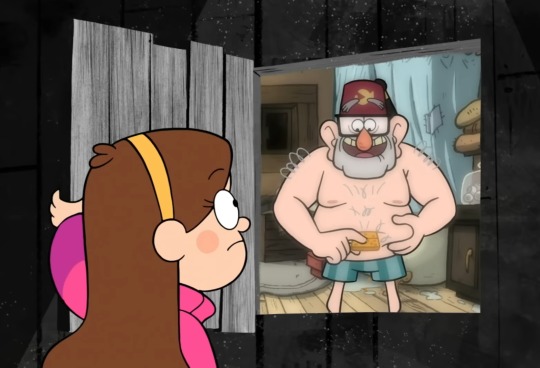
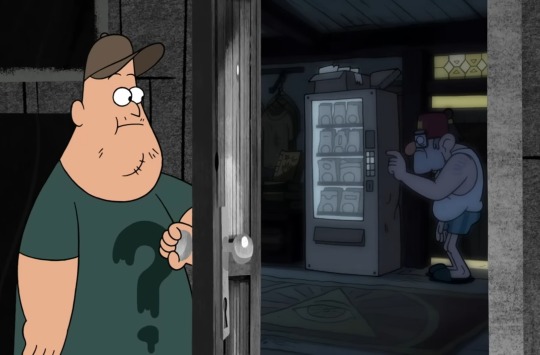
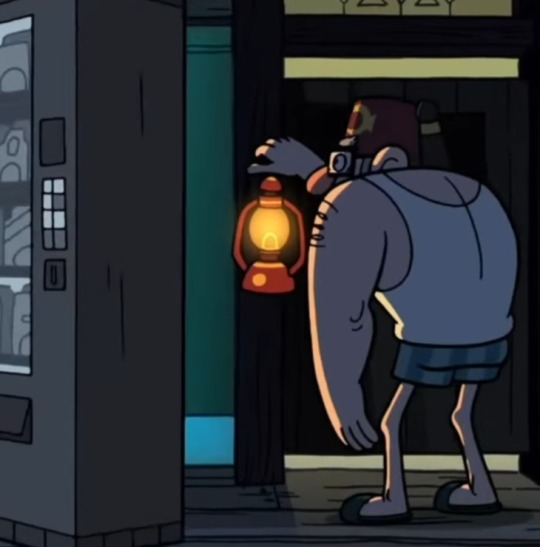
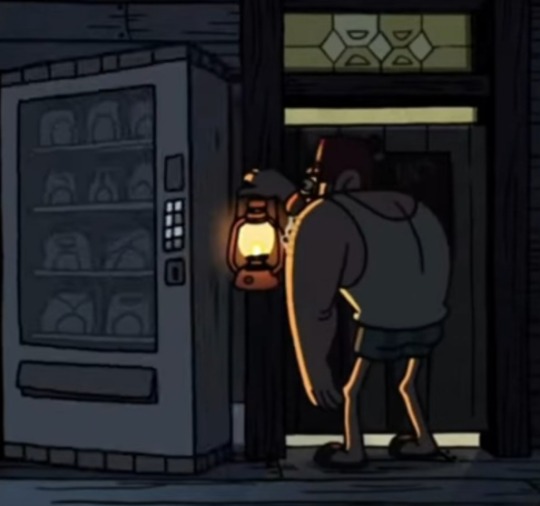
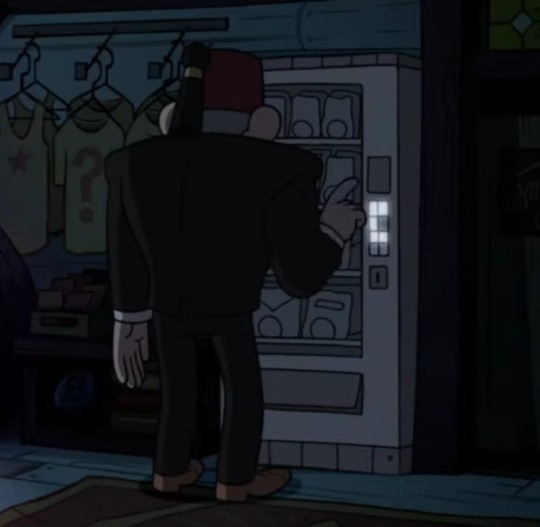
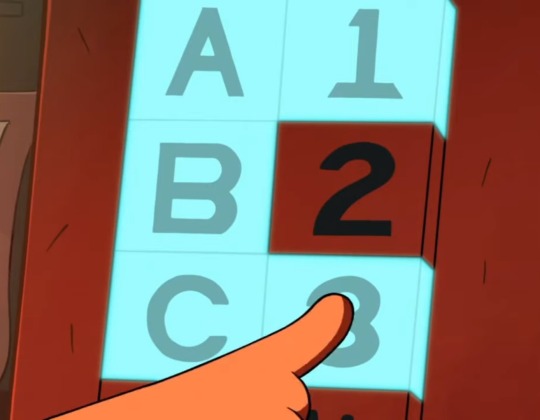
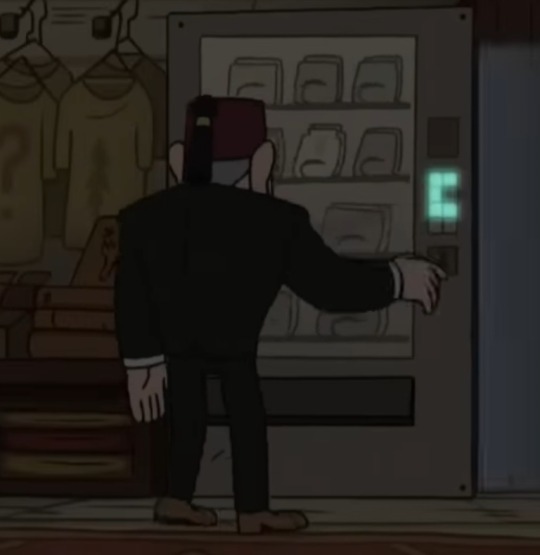
He subconsciously has misdirects for his secrets that are both silly and manages to disturb everyone too
And while Bill-as-Soos being bored by the vending machine memory is a joke that's basically the crew's way of going "hey remember the thing way back in the first ep that's going to show up in the next one?" and in-universe appears to be Stan slipping up, it's interesting that they had Stan input the wrong code when it's consistent literally every other time its inputted (especially when it shows up correctly in the very next episode)
It's even possible that the safe code that Bill found could have been a misdirect too but we'll never know since the safe got blown open by dynamite.
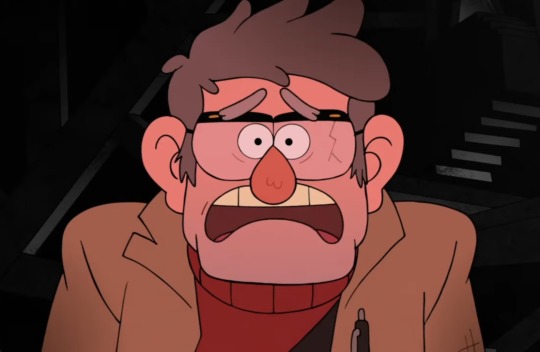
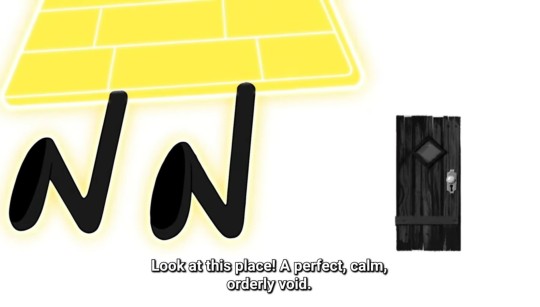
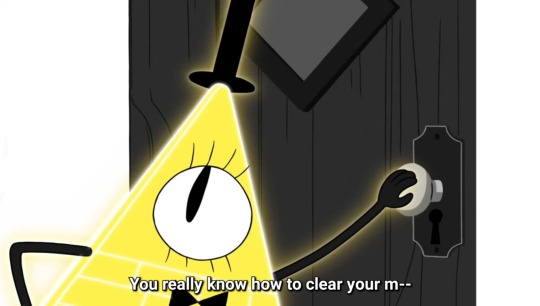
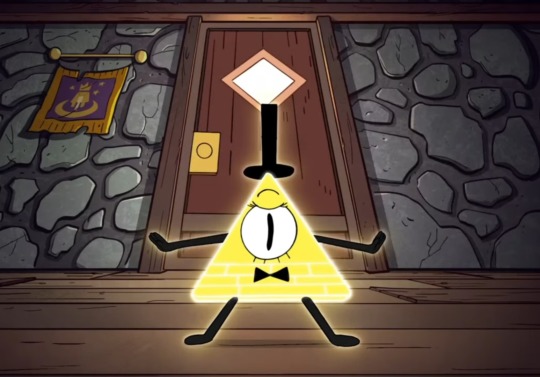
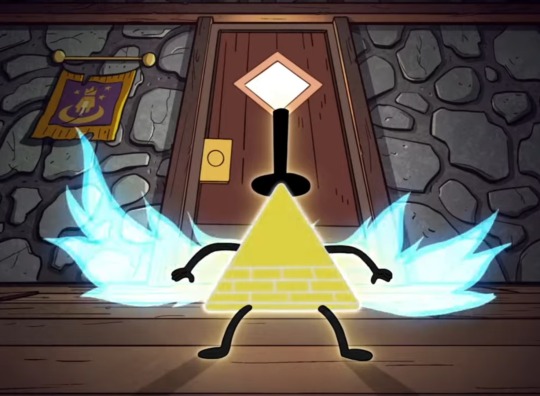
Stan was able to buy time by making his mind blank despite being genuinely terrified when Bill enters his mind (to the point that he breaks character and uses his own voice to yell), and could conjure up his living room (in colour opposed to his mind's regular greyscale) to make sure Bill didn't have enough room to flee, slamming the door in his face before the effects of the memory gun kicked in.
(EDIT: Random door analysis here)
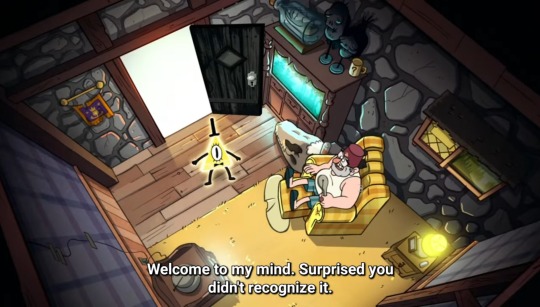
And maybe the twins eventually told him that Bill had already been inside his mind after their W3 reunion, but all we know was that his conscious self was left in the dark for ages and wasn't really aware of Bill until Weirdmageddon.
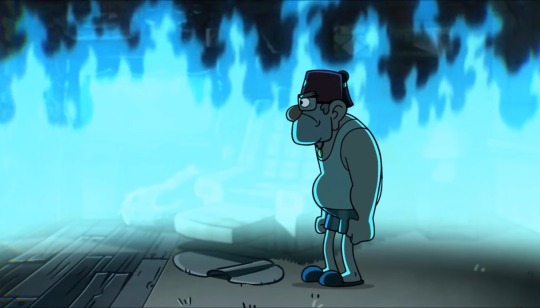
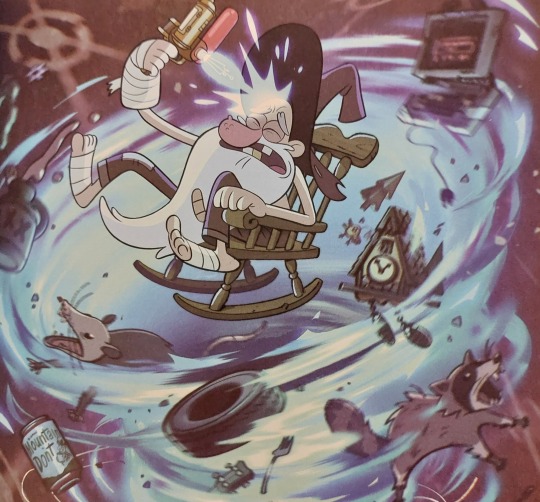

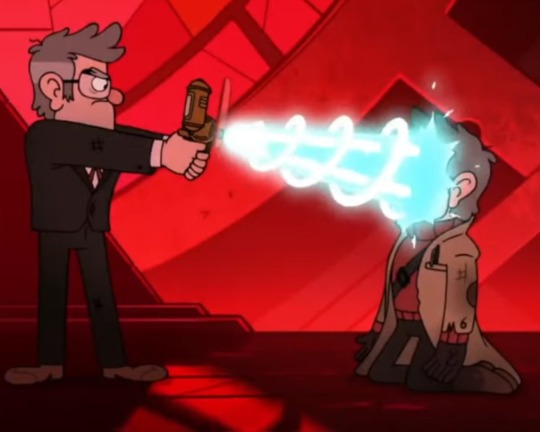
TBoB showing McGucket's dreamscape also brings up the idea of the effects of the memory gun manifesting differently to each person. To Stan's mindscape, the memory wipe manifests as blue flames which immediately brings to mind Bill's powers but it's a far lighter shade (maybe to more closely match the memory gun and its eventual fade to white?)
The end of TBoB and the website poem also firmly reminds us about Stan's connection to fire but there's also the question if Stan himself is actually aware of it...
#but also j3 having ford read dipper's entries post dd&md but not having him know about the kids' encounters with bill is so kashdskahd#cos that implies he immediately skipped the pages that mentioned stan 😭and didn't read mabel's entries#oh for him to actually react to dipper's observations about stan's mindscape....#stan pines#stanley pines#bill cipher#gravity falls#gf meta#yes of course my brain is still going ' same coin theory ooooo' at this#cos i doubt that j1 has any mention of the mindscape and it's not like stan would have studied this stuff#imagine iconic hippy hater actually mediating on purpose#i'm still waving my arms about stan potentially seeing the reader's version of tbob tho#but even if that ain't the case bill having a breakdown from him reading him like a book is still iconic#dunno if this is coherent and i'm pretty sure all this stuff is things most folks know but idk some people didn't read the journal#some folks don't know about the poem!!!! truly the biggest tragedy
1K notes
·
View notes
Text
Thinking about the fact that, to pull Gale from the stone and get him in the game at all, you have to decide to try to touch an extremely dangerous looking swirling mass of unstable magic. Something that is, objectively, a terrible idea
Like, the options it gives you are to either touch the sigil or leave, and if you leave you just... don't get Gale in the party
You have to take the risk. You have to let your curiosity override your common sense. You have to look at this unstable, possibly dangerous malfunctioning magic sigil and go "...Ok, but what if I poke it?"
In short, to get Gale in your party, you have to do exactly what he would in that situation, and indulge in a moment of reckless curiosity. And I just think that's delightful
#meta#gale dekarios#gale of waterdeep#i'm positive this has all been said before but ¯\_(ツ)_/¯#on a meta-gaming level of course it's just a matter of committing to the bit#the equivalent of that time in an actual dnd game when i said ''idk guys this sounds like a plot hook. we should probably go check it out''#but on a watsonian/character level? objectively not a great choice safety-wise#my husband for instance completely missed gale at first because he went ''...i'm not touching that thing it seems dangerous''#and idk. i just kinda love that for him. perfect introduction. nice little litmus test for if you can handle his chaos lol
2K notes
·
View notes
Text
hi welcome back to leanne rewatches deadpool & wolverine and goes insane about every single detail in this movie. in this edition: how logan's clothes reflect the trajectory of his character
1. the suit—inside
so we start off with the scene in the bar where logan appears to be wearing what we're used to seeing him wear. flannels, leather jackets. his outfit and even the setting is not at all unfamiliar for him. but, as we later find out, he was wearing the suit underneath all those layers the whole time.

during his talk with laura, he reveals that he wears the suit to remember those he'd lost, and as a reminder of what he'd done. he's had the suit on permanently for god knows how long, hidden under his clothes. at this point he bears the suit like a cross, suffering in silence under the guise of normalcy, yet sacrificing what's left of his identity by reducing himself to what the suit represents; by taking all the jabs and nasty looks people throw at him that he thinks he's too deserving of to combat.
2. the suit—outside

after wade pulls him out, he has the suit on display for quite a while. on one hand, it shows the fight that's in him now as a contrast to his passivity in his own world. on the other hand, it's also a sort of vulnerability: what that suit stands for and by extension what he himself is is now laid bare to the world. out in the open for people to question. maybe that fight that's in him now stems precisely from this vulnerability.
this vulnerability is both good and bad for him: it causes him to lash out at the questions from wade that he's not ready to answer. it also leads him to open up to laura and finally speak about what happened—who knows if he's ever said any of it out loud before. fun! even with just the suit, we're already seeing some development.
and THIS is where it gets interesting.
3. the white shirt—his mind
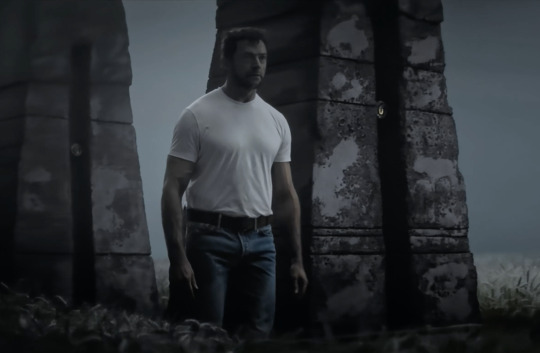
the first time we truly see him without the suit is when cassandra nova looks into his mind. i've been going back and forth on whether this is logan's own manifestation of himself or if it's cassandra's, and i still don't know. i think the distinction does matter, but in the end what it conveys is the same.
firstly, another layer of vulnerability again. he's already on his knees for cassandra, submissive—now in his mind he's also stripped as bare as he can be (i think we all know white shirts can sometimes leave little to the imagination). cassandra looks at him and says "you're hiding ... from all the ones you let down." how interesting is that?? if we go all the way back to the first scene, he hides his suit under normal clothes. and he hides this version of him in his mind even further underneath all of that.
secondly and as an extension of that point, white symbolises purity. cleanliness. even a promise of new beginnings. let's tackle this from the two possible perspectives.
if this is logan's manifestation of himself, it would be so intriguing that this is how he appears. maybe it means that despite it all, there's some good in him. maybe it means that deep, deep down, past all the shame and the guilt and the grief, there's still a part of his mind where he can just be.
on the other hand, the white could also symbolise a second chance—like i said, a promise of new beginnings. i made a post about this scene here, but the basic point is that cassandra is offering him something that no one else may ever be able to offer him. a chance to fully be himself, to silence the voices. the white is such a stunning visual representation of what she is saying logan could be if he stays with her. which makes it even more poignant that he doesn't.
4. the time ripper
after this scene, he's in the suit again, necessarily. but then! BUT THEN!!!!! the time ripper!!! y'all need to understand the significance of this scene in all its nuances FR! here you can look at his abs again:

but the thing is we know by now what the suit represents. all his failures, all his guilt, his inability to let go of his past. it represents him. isn't it just so fitting that it's at this point where he saves the fucking world that the suit breaks away. it breaks away from him. he's free. this not the same as him just taking it off, because with it breaking into pieces he literally cannot wear it anymore. this is not just a hugh jackman body appreciation, this is logan finally moving on. this is him realising that he is not a failure, that he is not his failures, that he has something else to live for.
5. him
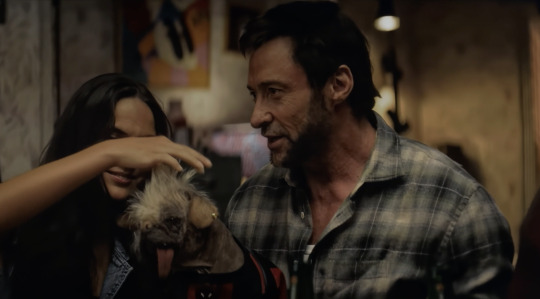
and oh my god, we finally make it to the extremely satisfying ending. after all of that, we finally come full circle. he's in his normal clothes again, the wife beater and the flannel, except this time without anything underneath. he's no longer defined by that one incident, defined by his mistakes and the people he let down. he is just him.
#user: gossippool 😝#gossippool metas#leanne rewatches dp&w for the 3rd time#wow ok i lost my mind for a bit there it's like 2 am now#i'm normal as you can tell#i'm going to sleep now hopefully i didn't hallucinate words and this still makes sense in the morning#deadpool & wolverine#deadpool and wolverine#wolverine#logan howlett#deadpool#wade wilson#poolverine
1K notes
·
View notes
Text
Do you ever think about how In Hushed Whispers, we wake up in this dystopian future and our immediate goal is to use magic to find a way back to the world as we knew it? We came across companions who had lived and suffered in this timeline for a year; indeed, it was their reality. Yet while we could relate to them and have compassion for them, and seek to help and comfort them as best we could, when they died it wasn't heartbreaking because to us, they weren't real. To us, it was nothing more than a nightmare of a world that had manifested in the blink of an eye.
Do you ever think about how modern Thedas is no more real to Solas than the alternate, dystopian future was to us? He woke up after thousands of years to find an unrecognizable world filled with oppression and magical imbalance, where the elves he sought to liberate now inhabit the lowest position in society as either slaves, servants, or in poverty. It isn't simply that the world isn't valuable as it is. It's that the world does not feel real. The people in it are disconnected from the fade and so to him, they feel like tranquil. And yet despite this world seeming no more real than a bad dream, Solas still cares about the people in it. He always approves of taking time to help out strangers, and enjoys discussing with the other companions to learn their perspectives and even encourages them during particularly difficult times (such as Cassandra's loyalty crisis with the seekers or Iron Bull abandoning the Qun). He dislikes violence and decisions that take away peoples' freedom. Even though this world isn't fully real to him, he still feels compassion for the people living in it.
And if the inquisitor comes to see him as a true friend or, Maker forbid, falls in love with him, the illusion snaps. The present is no longer a nightmarish dream world. It is real, and the people in it are real. But... so is the world he came from. The memories of that time are still fresh, no more than a couple years in the past to him. They are closer to him than memories of the COVID pandemic are to us. He can surely still remember vividly the taste of foods long gone, the beauty of magic-imbued cities, and the vibrant life of a civilization that was never separated from the fade--which is the way the world was natural designed to be.
This beautiful world that has become lost to time, that exists only his memory, fell because of him. Only he has the power to fix what he broke. But how can he make that choice, when the once dystopian dreamworld becomes just as real as the world he feels duty-bound to restore?
#not sure exactly where I'm going with this#I just... have thoughts#solas#solas meta#dragon age#dragon age inquisition#dai#solavellan#datv#dragon age the veilguard
2K notes
·
View notes
Text
the more I play the more I think lucanis basically knows it's illario who betrayed him right from the beginning (he's had a year in the ossuary to think. not that many people knew where he was going. when you ask him 'did Illario know you'd be on that ship' his only answer is the hardest flattest 'yes' you ever heard). so it's not so much about figuring out who the traitor is (because that's ludicrous. we all know. immediately. they didn't really bother to hide it lmao) as about methodically closing off every single avenue of denial lucanis has clung to that whole time with as much or little gentleness as you might prefer until he has no choice but to admit it. because the moment he has to admit it, he'll have to do something -- feel something -- about it. and that's such a catastrophic event in lucanis' inner landscape (he has had TWO people in this whole entire world up until now and will do anything to hold on to them with a heartbreaking child-like desperation, even at and especially through the detriment of his own self) that he'd rather just. not. what if we quite simply. didn't. what if we just stayed here in the emptiness where we can both pretend you didn't hurt me in a way I should never forgive. I have so much practice in that with caterina already it's always worked out great for everyone so far. (press x to fucking doubt but that's trauma logic for you lol)
after everything illario did, so much of the storm of lucanis' emotions around it is 'what the FUCK did you get yourself tangled up in this time and how do I get you out of this mess safely'. what's worse: the fact that your brother murdered you, or that he put himself in horrible danger doing so and thus exposed you to the risk of losing him forever. lucanis' heart certainly has an opinion here and it's fucking unhinged (affectionate)
the themes of dissociation in lucanis' character in general makes me feel nuts. allllll these contradictory messy things he needs to cut off from each other because they can't coexist or be easily reconciled inside him. but all remain stubbornly true separately anyway and will have their due one day. love and resentment. tenderness and fear and rage. terror and longing. love and freedom don't coexist. the burned out golden child anthem is playing in the background. he was always caterina's favourite and he has to keep striving to deserve that dubious honour with every breath he takes and then, presumably, mercifully, some day he will die and be excused and can rest. and until now he's suppressed all the -- natural, healthy, protective! -- negative feelings that threaten the few attachment relationships he actually has, at the cost of ever actually having his needs for connection and safety met and leaving his core self imprisoned and compromised. and spite goes 'what. no. that's dumb fuck that' (*spite voice* I do not understand that and even if I did I would not respect it) and does not allow him to fall back into that, which I think is what saves his life, ultimately. it took being possessed by a demon for lucanis to even contemplate telling anyone he loves 'no' in any way, but hey. whatever gets you there right lol
lucanis is dealing with the freeze response allll the way down baby. and he was even before the ossuary, that just turbo powered it and brought it to a breaking point way before it could happen naturally. but something was going to break eventually no matter what, and I'm just glad that in the end, through the power of friendship and also pure spite, it doesn't have to be him
#I am worried about him all the time. but also: his found family of godslaying maniacs and also the power of love. there are reasons to hope#when there was only one set of footprints in the sand that was the veilguard party holding lucanis in their arms#and going 'excuse you he said no FUCKING pickles!!!' while he's like '🥺should you guys really be -- ' 'YES'#dragon age#dragon age: the veilguard#dragon age: the veilguard spoilers#dragon age spoilers#lucanis dellamorte#dragon age meta#there's some messiness to his arc but what mary kirby managed to capture here about how this works. is everything to me#he is so exactly for me. I'm sorry for all the people he turned out not to be for. but not for him being for me#the gift of looking at him and hearing 'you're more than what you're going through' and be forced to annoyedly go 'okay#MAYBE that could be also be true for me. maybe.' he's going through it. and also so much more and the funniest person in the world#he's so worth it to still have in the world!!!!#I'm so glad we don't get to 'fix' his relationship with his family and especially caterina actually#that is stuff that would need to happen on a time scale waaay outside of the one in this game#and there's Something very real in having to go 'this is not for me to decide for you. who you love and what you do about it is yours'
901 notes
·
View notes
Text
as much as I love the common "Tim worships/stalks Jason" trope in TimJay fanfiction because it's Good and making Tim a weird little freak is Fun, I think the underutilized dynamic is where Jason is the one weirdly obsessed with Tim and makes it Tim's problem.
Like, the moment Jason is confronted with the information that a third Robin exists, the first thing he does is cover his wall with pictures of Tim so he can just obsess and torture himself over it. That is the behavior of a man who is Unwell over Tim's existence and I love it.

red hood: lost days #4
And as much as a shitshow as The Titans Tower Incident™ is characterization-wise (though I think it has far more merit in depicting Jason's character than people give it credit for but I digress-) there's something very fun about the fact that even after kicking his ass, Jason respects Tim and is impressed by him.

teen titans (2003) #29
And on top of that, Jason can't seem to stop trying to ask Jason to Tim to work with him in some capacity.


robin (1993) #177



batman: battle for the cowl #2
While Battle for the Cowl is an exceptionally bad comic, especially for its characterization of Jason and the "be my Robin" bit is taken deeply out of context, I do think it's interesting how obsessed Jason is with believing that Tim is extremely competent, only held back by being "brainwashed by Bruce". (hence him leaving Tim for dead later on in the comic.) Jason seeing a darker side of Tim and wanting to bring that out of Tim, wanting to see what Tim could be if he let go of his loyalty to Bruce is so fun to me, tbh.
And in Robin #177, Jason seems genuinely upset Tim doesn't want to work with him. Jason sees such a raw potential in Tim and is obsessed with it, constantly wanting Tim to work for him and see Tim be the type of person Jason is. And despite Tim rejecting him, Jason doesn't shoot to kill Tim. I just cannot get over the fanfic potential of Jason obsessing over Tim, tracking him and seeing what he's capable of and what he could be capable of. Wanting to make Tim see things the way he does. To Tim it's corruption, to Jason it's freedom. Tim trying to 'save' Jason is fun and all, but Jason trying to corrupt Tim? That's even more fun to me. Watching that power struggle between them, Tim unable to get Jason off his heels as Jason gets more and more possessive and bold with each attempt.
And when Jason sees Tim successfully get Gotham back under control after a gang war, he's impressed. He praises Tim, even. And then Tim just. Breaks him out of prison.

robin (1993) #182
The way they're constantly trying to see something in the other that isn't there, hoping the other will come around? That is the most fucked up hate/love dynamic ever. Jason keeps coming back to Tim, keeps trying to find ways to get Tim onto his side. They're always chasing each other. And I think Jason would be the one to confess love first, the one to do anything to make Tim his. And when you consider after all of this, Tim has his Red Robin arc and is at his lowest, getting the closest he ever gets to considering murder? I think it'd be so fun to see Jason take advantage of that and worm his way back into Tim's life and finally push Tim over the edge.
#jaytim#timjay#tim drake x jason todd#jason todd x tim drake#batcest#necrotic festerings#for the record i could've continued showing examples if i delved into the new-52#but this is meant to be entirely a pre-flashpoint meta analysis of their dynamic#but in the new-52 jason explicitly says tim is the only member of the batfam he likes and they work together regularly#but new-52 also ate ass with tim's characterization so i cannot use it in good faith on this post.#my first tumblr meta on this blog and i'm feeling stressed about putting my thoughts in the open won't lie#one day i'll come back to the titans tower incident and expand on my thoughts on why it's not as bad as ppl make it out to be#dare i say. it's mostly in character for jason minus the ridiculous robin suit and some of his grandstanding#but that debate is for another day#fyi anyone can take this stuff as a prompt/inspo and run with it for fic pls go wild#someday i'll probably write my own take on it too
1K notes
·
View notes
Note
Hi it's just to let you know that the official romanization of Revaan's name is Raverne ! Also they have romanized Baul's name to Baur !
Twst coming back at us again with the least expected romanization! thank you everybody (oh god my inbox) (no it's great, I literally asked for this and the reactions have been INCREDIBLE, thank you all!)
I do like Raverne though, I think it's got a nice fancy sound to it! (I had kinda suspected it was going to be an R instead of an L, so the fact that it's SO close to Laverne except for that is hilarious to me personally.) and Dragoneye Duke is honestly probably the best translation for his title, I wasn't envying the localizers that one. :') Baur instead of Baul I was NOT expecting, but in retrospect I think his name's supposed to be a reference to the Bauru crocodile, so that actually makes way more sense!
someone else also said Meleanor has become Maleanor, which is the REALLY weird one to me, because I was so surprised it was written as Mel instead of Mal in the first place?! oh god no I can't decide which one I like better. 😭 (I wonder if they might change it to Mal...they have made romanization changes before) (like I remember House of Distraction being corrected to House of Destruction in Playful Land) (I did check and she's still Mel for now, but I dunno, they might Mal her up and some point and save me from having to make a decision about which one to use) (HECK I CAN'T DECIDE)
uhhhh thank you for letting me ramble about anime names, let's just say MONOGRAMMED SWEATERS FOR EVERYONE
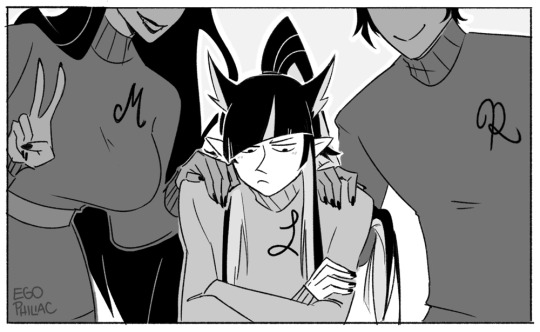
#twisted wonderland#twisted wonderland spoilers#twisted wonderland episode 7 spoilers#twisted wonderland book 7 spoilers#twisted wonderland episode 7 part 4 spoilers#twisted wonderland book 7 part 4 spoilers#mel is so cute but mal fits with the rest of the draconias better#eng version no you were supposed to save me not make things MORE confusing#anyway raverne huh#that uh. that sure feels like it's supposed to evoke raven doesn't it.#what does it mean WHAT DOES IT MEAN#hold on i'm going to flail around embarrassingly about anime character theories now#(okay first a disclaimer: i do think we need to sit down as a fandom at some point)#(and have a discussion about exactly what is actual canon versus meta speculation versus jokes)#(because i think there has been. some confusion. over that re:crowley and raverne specifically)#(but i do feel justified in being like THEY ARE PROBABLY CONNECTED SOMEHOW RIGHT?! right now)#like i really don't think it's as simple as crowley being raverne but with memory loss or something#(and if they pull that on us i'm going to need an EXTREMELY good explanation to go with it to justify that)#they've gone out of their way several times now to make a point about them acting and sounding different and it feels very intentional to m#(and once again: i super 100% absolutely do not believe that lilia wouldn't recognize him with the top half of his face covered)#i just think the contradictions are a lot stronger than the connections right now but there ARE some connections and i'm 👀ing at them#to be fair the connections are mostly meta like crowley being diablo/raverne being evocative of raven#also the general 'raverne mysteriously disappeared and apparently had distinctive eyes' thing#versus 'crowley's past is unknown and he never shows his eyes'#(i will argue that crowley DOES seem to have some kind of canon connection to briar valley)#(since he is clearly some sort of fae and the masks are a briar valley thing)#and that is kinda it right now isn't it#okay hold on i had to delete some tags because i used too many (thanks tumblr for letting me know and not just vanishing them OH WAIT)#so tl;dr: i'm in the 'crowley is connected to raverne somehow but it's more complicated than just him being in disguise' camp personally#but that will probably change as we get more info and also don't take this as an anti-speculation thing because i love theories HOORAY
2K notes
·
View notes
Text
The lighting in the S1 1941 flashback is so painfully dark I was rewatching it on a 150% brightness and perhaps I am five years late, but how come I've never noticed that this
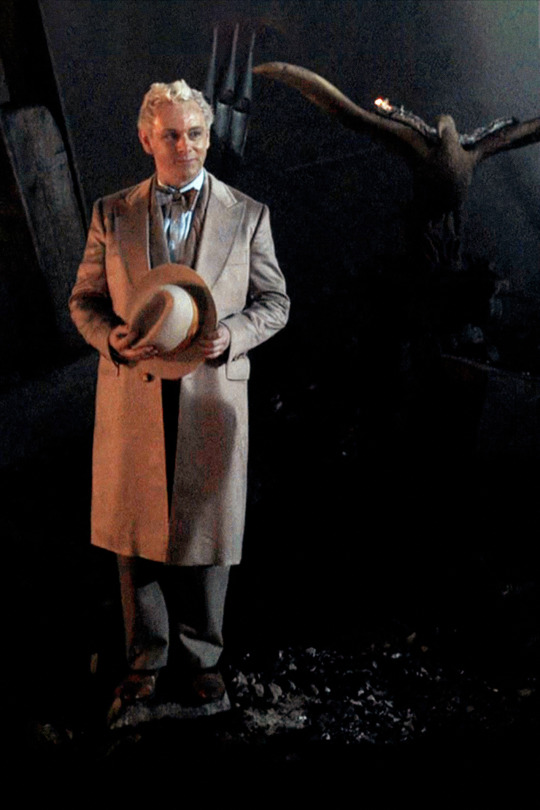
is how Aziraphale gazes at Crowley before the "little demonic miracle of my own"???
This is him before the love realisation, just after Aziraphale miracled them both safe from the bomb exploding on the church with the Nazis. No heartwarming acts of service yet — best to his knowledge, Crowley was only there for moral support, because he "didn't want him to get embarassed". And his gaze is— I don't know what to say. Like it would kill him to look away. So fond, so immersed, "oh God, there you are", like hundreds of years have passed, not decades since they saw each other last. Books? What books? What air raid, what war?
Arguably the best part of the scene happens literal seconds after. If you pay close attention to the whole shot, you'll spot the brown satchel on the side. Which Aziraphale would notice earlier too, if he could focus on anything other than Crowley.
#good omens#good omens 1941#aziraphale#crowley#ineffable husbands#aziracrow#aziraphale x crowley#good omens analysis#good omens meta#ineffable spouses#good omens s1#gos1#anthony j crowley#i'm going to be sick#michael sheen what if this is my last straw? what then?#i blame the eternal darkness of these shots that i've only noticed this now#aziraphale was there!! smitten gone so SO BAD for him!!!!! and he was the one who did all the hard bits!!#end me please#marcela talks
1K notes
·
View notes
Text
It just hit me that Cassandra Cain, a character who was ultimately created because of the fallout of the Killing Joke, is the ultimate antithesis to the "One Bad Day" ideology Joker states in that story and I find that beautiful.
Since she was born she's had countless bad days and yet she still chooses to be a hero at the end of each of those days.
She's quite literally the ultimate fuck you to the Killing Joke in multiple ways by not only proving Joker's ideology wrong but also continuing the legacy and character of Batgirl.
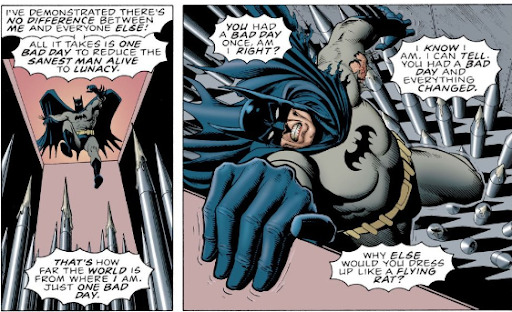
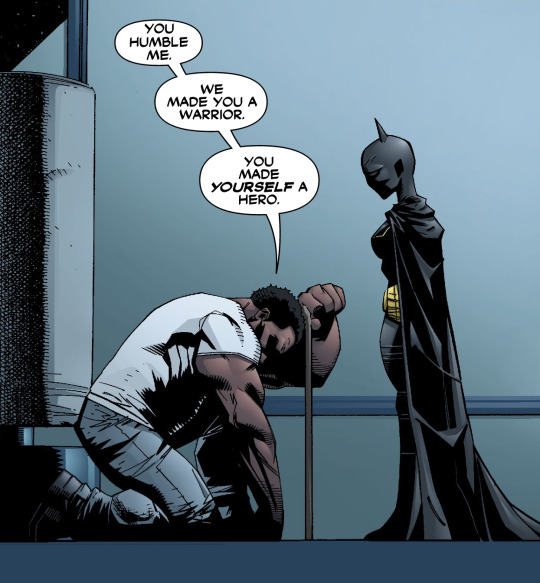
#cassandra cain#batgirl#the joker#joker#barbara gordon#batman#does this count as a meta post?#idfk#i feel like i should go more in-depth tbh but like i think i'm cooking something#the killing joke#dc comics
696 notes
·
View notes
Text
Ned was doomed before the beginning of the story; the direwolf has already choked on the stag antler in time to be found as an omen, Robert & Ned's fates are intertwined, Jon Arryn died from what he swallowed and Robert chose Ned to be Hand of the King, there is no way turning down a royal offer like that works out safely, and no way accepting it works out safely either. Ned was doomed, the gods just gave him a heads up.
But he became doomed in a particular way the moment he swung the sword down on Lady's neck.
The gods said hey, you're doomed, but here's the symbol of your house given mortal form to aid your children, and Ned killed one. His king gave a cruel, unfair order Ned disagreed with, that would hurt a child under his protection, his own daughter, to end the life of a creature that had done no harm, not for meat or furs to survive the winter but merely to satisfy the royal family's sense of offended dignity, and Ned carried that order out personally.
Ned killed Sansa's protector. He killed a gift from the gods.
Of course his own life ends on the royal executioner's block, a sword swinging down.
#I'm sure this has all been said before but here we go anyway#misc meta#misc parallels#Ned Stark#A Song of Ice and Fire#you FUCKED UP Ned#yeah you had no good choices! this probably wasn't even the WORST possible choice in the circumstances!#but oh boy was it not the best and oh boy did it doom you
982 notes
·
View notes
Text

It's getting cold and I'm going on my winter core ark
#kirby fanart#meta knight#my tablet is fixed !!!#I'm very excited for the cold season can you tell#yes the others are going to get their own fit changes too#glazed art
431 notes
·
View notes
Photo
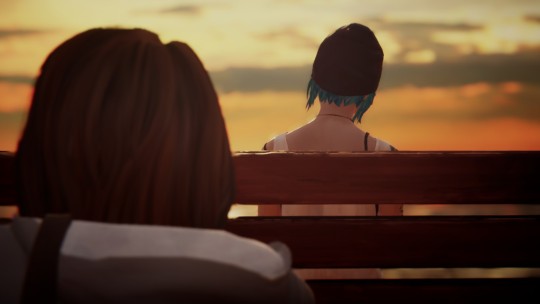
Do you ever think about the fact that this is the first optional picture of Chloe Max can take in canon?
Do you ever think about how this is the first picture Max has taken of Chloe in five years?
Do you ever think about the fact that the first picture Max takes of Chloe is one where she’s framed by a golden sky? Despite the fact that Chloe herself is most tied to storm’s, in Max’s lens, she is tied to the sun. Which is, in fact, insane.
Do you ever think about the fact that the first picture Max takes of Chloe is one on the cliffs? A place heavily tied to their childhood’s and the place where they decide their fates?
Because I think about it a lot.
#To celebrate it being LIS week I'm going to be doing Pricefield meta till the 11th!#LIS#life is strange#pricefield#Chloe Price#max caulfield
720 notes
·
View notes
Note
What's your stance on Ford as a person? Honestly, I believe that for thr majority of canon he is a bad person. But I believe he grew. Still not great though XD
(Love him anyways obvs)
I disagree entirely! I think he's equally as good a person as any of the other main cast.*
*Except Mabel, who, as we all know, is always right about everything.**
(**This is a lighthearted joke. For the love of god, I don't want Mabel discourse in my inbox.)
His biggest sins in the show:
After telling his brother that he was thinking about changing their shared life plans, and then discovering that his brother had gone to the high school that night for no good reason and gone to the science fair for no good reason and messed around near Ford's science project for no good reason and broke it and didn't tell Ford about it... Ford believed Stan did it intentionally and held a grudge for it. You know what, it WOULD be pretty damn hard to believe it was an accident.
Hilariously ill-equipped to cope with Fiddleford's mental health. A guy who responds to "I have anxiety" with "have you tried yoga, it helps me" isn't a bad person, he's clueless. "Character cheerfully enacts a bad idea while a loved one in the background goes NO PLEASE DON'T DO THAT" describes half the episodes of Gravity Falls.
Was successfully manipulated by a professional manipulator into believing his best friend wished him ill. Man, what a terrible person Ford is for being manipulated by a manipulator and saying cruel things to somebody he'd been genuinely convinced was trying to harm him.
??? Didn't say thanks to a guy he was still mad at after the guy fixed a problem he himself had caused. This is a solitary example of stubborn bad etiquette, jesus christ. There's half a dozen different reasons why it makes perfect sense Ford wasn't in the right mindset to feel grateful, this is not something worth indicting his entire character over.
He had high ambitions, which everyone seems to lambast him for, but high ambitions that wouldn't have required doing anybody harm! (Until the professional manipulator started manipulating him into harming the people around him, but we are going to demonstrate some reading comprehension and not blame Ford's underlying morality as a person for things he never would've done if not for Bill's bullying, con artistry, and outright lies.) Like, what is it that he wanted to do with his life? Use his talents to get rich and famous? Shit, that's exactly what Stan wanted to do with his life. It's what Dipper fantasizes about doing with his life. Even Mabel, who thinks about her long-term future the least, dreams big with her art & performances and is already making big money off cheap-ass commissions. What terrible people they all are, for—let me check my notes here—uhhh... unrealistically fantasizing about achieving success in life by doing the things they're good at.
When their dad accuses Stan of lying as a child, Ford puts his entire summer on the line to defend Stan even though he knows Stan is a habitual liar and has no reason to believe Stan is telling the truth this time.
When his new college roommate he barely even knows gets laughed at for proposing an outlandish scientific theory, his first emotion is outrage at this injustice and he drops everything to convince his already-despondent roommate that he was right and help him prove it beyond a shadow of a doubt.
When he moves to a new town, he tries again and again to befriend his new neighbors, and fails not because he's rude or a jerk, but because he's awkward as hell, tells terrible jokes, and sucks at identifying phoenixes.
When Fiddleford gets hurt around him, he cares about it, feels guilty about putting him in that position, doesn't want it to happen again, and tries his best to help even though he's bad at helping.
When he gets kidnapped by a weird holiday folklore creature, he concludes without even thinking about it that he's now in charge of protecting and rescuing the kidnapped kids. Yeah, then he immediately starts hollering at the folklore creature for trying to impose his religious beliefs on Ford and the kids—but like, Ford was right tho, he just had bad timing.
When he discovers that the Northwest family committed atrocities against their poorer neighbors a century ago, his first instinct is to march up to their house, find the first Northwest he can locate, and give them a piece of his mind for it. Like, this won't even FIX anything. He's just THAT OUTRAGED over the injustice.
When he sees what he thinks is a fortune telling fraud conning the people, he attempts to debunk her because he's mad to see someone cheating other people with lies—and when he can't debunk her, he just leaves her alone rather than harass her about it. Typically, if assholes think somebody's doing something wrong but don't have any proof of it and fail to get proof when they look, they decide they're right anyway and keep giving that person shit. Ford doesn't give her shit. That's the opposite of an asshole move.
When he discovers his Portal To Knowledge (And Fame & Fortune) is actually a Portal To Doom (But Still Possibly Fame & Fortune, Maybe Even Godly Power), he isn't tempted for a second to keep working on it anyway. There is no moment where Bill manages to tempt him. No matter what Bill offers, no matter how long Bill offers, never, at ANY point, does Ford have a SECOND of "but what if I did make a deal with the devil?" the way so many heroes in similar situations often do.
You ever notice that? So often moral moments in the show are presented as choices the characters make. Will or won't Dipper give Bill a "puppet" in exchange for knowledge. Will or won't Stan fight a pterodactyl to protect Mabel's pig. Will or won't Mabel hand Bipper the journal. Ford is never given a "will or won't he" moment over Bill's threats, offers of friendship, or offers of infinite power—he steamrolls straight past them without a second of consideration—because, to him, the selfish, cowardly, easy choice ISN'T EVEN AN OPTION. He doesn't even SEE it as making a choice because the possibility of doing the wrong thing is invisible. A character who wavers first before turning Bill down would look more noble for "overcoming" temptation—it's harder to notice just how much stronger Ford's moral compass must be to not even feel temptation in the first place.
Greed and pride never tempt him to join Bill's side. Exhaustion, despair, and fear never tempt him to give up. He bears up under weeks, possibly months of extreme sleep deprivation, physical torture, psychological torture, emotional torture, threats of death, threats of brainwashing, threats to his family. He doesn't hold up so that he can pat himself on the back for being a hero—if that was all it was he would've gone "screw it, this isn't worth it and nobody would know I'm the one who gave up" a week in—he does it because he simply knows it must be done and because he's so isolated (half because of Bill's influence!) that he believes he's the one who must do it, all alone.
Thinking he has to do it by himself isn't egotism or pride; it's helplessness. He thinks no one else stands a chance. He thinks he's alone.
And, when he discovers his Portal To Knowledge is a Portal To Doom, he immediately feels guilty. No trying to deny the situation to protect his ego. No shuffling the blame off to someone else. No "maybe the apocalypse could have a silver lining!" No locking the door and trying to ignore the problem. He blames himself for being fooled—he IMMEDIATELY takes full responsibility for his actions—and he CONTINUES to take responsibility FOR THE NEXT THIRTY YEARS.
He takes more responsibility than is even warranted—he treats himself like he's an idiot for believing in an APPARENT GOD who's been practicing manipulating humans for thousands of years and who had never given Ford reason to believe the portal was anything but what Bill said it was. He beats himself up to no end every single time his past with Bill comes up. He even keeps beating himself up thirty years later when he's shoving warning notes to future readers in Bill's evil unkillable book!
When he falls into the multiverse, he dedicates his entire life NOT to finding a way to rescue himself, but to finding a way to permanently stop the CHAOS GOD who's still at the threshold of destroying Ford's world and countless others. He makes himself a hated criminal in the process, just to stop Bill. He's ready to spend the rest of his life trying to protect a world he doesn't think he'll ever see again. He does it because, as he sees it, somebody has to stand in between the children and the obnoxious folklore cryptid menacing them, and he's the only adult in this damn cave with the skills and knowledge for the job.
When he gets home, he doesn't tell his family about Bill and his quest because he's afraid that doing so will get them involved and endanger them too—and because he's too deeply ashamed of himself and his mistakes to stand the thought of his family knowing about the horrible things he's done (AGAIN, WHILE BEING MANIPULATED BY THE GOD OF MANIPULATION).
He loves his great-niece and great-nephew the second he lays eyes on them; he nevertheless tries to steer away from them to keep them safe from Bill; and yet he caves to the very first temptation to emotionally bond with his great-nephew he gets, because in spite of his noble "keep them safe" intentions, he wants so so badly to be close to his family.
As pissed as he still is at Stan and even though neither of them can look at each other without hissing like cats, he still makes an attempt to start bridging their divide by inviting him to play DD&MD.
When the apocalypse happens, he immediately puts his life on the line to try to kill Bill.
And when he's captured, isn't fazed for a second by Bill's offers or threats... until his family is threatened. The exact thing he'd been trying to avoid & prevent from the very start.
And when he's reunited with Fiddleford, his immediate reaction is to point out that Fiddleford's well within his rights to hate him—which isn't a new revelation, it's not like Ford had to do any soul-searching to reach this conclusion, he'd concluded that 30 years ago the instant he realized Bill had played him and that he'd been lied to about Fiddleford.
And then he tries to kill Bill again.
And then he's ready to sacrifice his own life to kill Bill—and the only reason he doesn't is because he has a metal plate preventing him from making the sacrifice... but, Stan doesn't have a plate. If Ford hadn't had the metal plate, he would have gladly done the exact same thing Stan did—and he would have thought it was right for him and only him to make that sacrifice, because it's VERY clear he feels (and has felt from the start) that this is all his fault and he's obligated to fix it.
Over and over and over, these are Ford's two defining character traits: getting so pissed off at injustice that his common sense shuts off and he goes into terminator mode until he's righted this wrong as best he can, even when he can't actually do anything about it; and feeling like he's Atlas, weighed down with the full responsibility of fixing everything he's done wrong and made to believe that, for everyone else's sake, he has to do it all alone. Even when doing so puts himself in harm's way, even when he has to put his entire life on hold for it, even if it might cost him his life. Scrape off his awkward social skills, his loneliness, his nerdiness, his endless curiosity, his zealous love of the strange, his starry ambitions, his yearning for recognition and success—scrape his personality down to the bone and that's what you're left with. A man who believes in defending the exploited so strongly that it makes him a little stupid.
I'm gonna go out on a limb and assume that you probably don't think Stan's fundamentally a bad person, and that you probably think that isn't even worth questioning. Stan's made a whole career out of swindling people, conning them out of as much money as he possibly can, stealing, lying, committing a long list of goofily-named crimes, and attempting douchy pick-up artistry on women; and to cap it all off, he held the safety of the entire universe hostage to demand a goddamn "thank you." Don't send me any "But he had reasons—" "But it was only to—" I don't need it, I don't want the essay, I'm not arguing that Stan's a bad guy, it's fine.
But. You can look at Stan's moments of cruelty and unkindness, his uncharitable thoughts, his character flaws, and think, "that doesn't define him. He's more than his cruelest moments and worst mistakes. He's imperfect, but he cares so much and his heart's in the right place, and beneath all the flaws his core is good."
And if you can't do the same for Ford, it's not because he's a worse person. It's because we got two seasons with Stan and five and a half episodes with Ford—and while we saw Stan yearning to fish with the kids or encouraging Mabel to whoop Pacifica's butt at minigolf or crying over a black and white period drama or punching zombies to save his family, we only saw Ford at the worst moments in his life and under the stress of a prolonged apocalyptic crisis—and, it so happens, all the moments he was pissed at the guy we spent two seasons learning to love.
Ford's got moments of cruelty and unkindness, uncharitable thoughts, and character flaws. But, at his core, he's a good person, and he always has been, and he still is.
#anonymous#ask#gravity falls#grunkle ford#ford pines#(note to self: when you see an ask that makes you go 'god i don't wanna get into this; i'll type something quick & punchy and move on'—)#(—do NOT start typing something 'quick & punchy' when your adhd meds are wearing off.)#(they WILL last just long enough for you to snap into a hyperfocus but not long enough for you to have the power to stop typing.)#(i'm thirsty.)#meta
573 notes
·
View notes